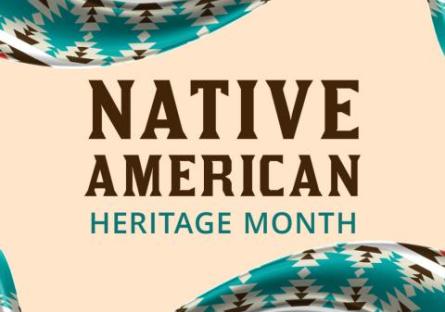This article appears for archival purposes. Any events, programs and/or initiatives mentioned may no longer be applicable.

Multiple Events Celebrate Native American Heritage Month
November is Native American Heritage Month, and Scottsdale Community College (SCC) is proudly celebrating given its special affiliation as the only two-year public higher education institution located on Native American land, through a partnership with the Salt River Pima - Maricopa Indian Community.
The beginnings of a national recognition of Native American heritage started December 14, 1915, when Red Fox James, a Blackfoot Indian, rode horseback from state to state seeking approval for a day to honor Indians. He presented the endorsements of 24 state governments at the White House. A year later, the first American Indian Day in a state was declared on the second Saturday in May 1916 by the governor of New York. In 1990, President George Bush approved a joint resolution designating November “National American Indian Heritage Month.”
During the entire month, SCC is featuring many events to highlight the images, names and stories of the American Indians. All events are free and open to the public.
Salt River “Feed a Family” Food Drive
From Nov. 1 through 22, SCC’s American Indian Program and SCC’s Council of Student Leaders are holding a benefit to support families from the Salt River Pima - Maricopa Indian Community through the Social Behavior offices. Bring donations to Culinary Arts, Fitness Center, Library and the American Indian Program (ICC-203).
Missing and Murdered Indigenous Women Awareness Display
The SCC Library hosts during November this impactful story about missing and murdered Indigenous women. The epidemic is an issue currently affecting Indigenous people in Canada and the United States, including the First Nations, Inuit, Métis, and Native American communities. As a group that has been "socially, economically and politically marginalized", Indigenous women have been frequent targets for hatred and violence. Underlying factors such as poverty and homelessness contribute to their victimization, as do historical factors such as racism, sexism and the legacy of colonialism. Indigenous women are between 3 and 3.5 times more likely to be victims of violent crime than other women, and the violence they face is often more severe.
Dawnland Documentary
This documentary discusses cultural survival and stolen children inside the first Truth and Reconciliation Commission (TRC) for Native Americans. The feature-length documentary follows the TRC to contemporary Wabanaki communities to witness intimate, sacred moments of truth-telling and healing. With exclusive access to this groundbreaking process and never-before-seen footage, the film reveals the untold narrative of Indigenous child removal in the United States. 6 p.m., Nov. 6, in ICC-222.
Miss/Mister Indian SCC Pageant
Students vie for the title of Miss/Mister Indian SCC at this event which includes traditional dress and talent, impromptu questions and platform presentations. 6 p.m., Nov. 12, at the Performing Arts Center.
7th Annual Rock Your Mocs
This worldwide Native American and Indigenous Peoples movement held annually during November. Wear a Turquoise Awareness Ribbon to show your support. Nov. 13.
Missing and Murdered Indigenous Women Awareness Information
On Nov. 13, students bring awareness to this important issue and share the importance of addressing the topic and the necessary steps to seek help.
ISA Fry Bread Sale
Come to the East Patio of the Indigenous Cultural Center at Noon, Nov. 18, and support the Indigenous Student Association (ISA). The Fry Bread is always fresh and hot.
Indigenous Enterprise, Native American Dance
On Nov. 18, stop by for a visit at Indigenous Enterprise, LLC. They believe in what we call the three Ps. First, Preservation, which we pursue through teaching. Next, Performance of traditional dance and song. Finally, Progression, we understand that culture changes with its people and that we as the Native young bloods of America are the pioneers of this cultural movement.
American Indian and International Culture Sharing
At the Indigenous Cultural Center, from 3:30 to 6:30 p.m., Nov. 20, the SCC American Indian and International students share parts of their culture through individual demonstrations of art, beading, making dream catchers, storytelling and more.
Native American and International Cultural Retro Muse
Enjoy a focus on Native American culture Nov. 21 at the Retro Muse, a favorite place for SCC’s artists to share their writing, music, art, acting, singing and dancing – all held from 12:30 to 1:30 p.m. in the LC Courtyard. The open mic format is relaxed and informal, so come participate, relax, and enjoy. Because of its unique location on Native American land, SCC features programs that directly support the Community. The American Indian Program was created in the 1970s at SCC to address the constantly changing and highly diverse educational needs of American Indian students and communities. The mission of the American Indian Program is to provide comprehensive academic and personal support that promotes opportunities for a successful and enhanced college experience for the American Indian
student.
In 2018, SCC opened the Indigenous Cultural Center, the realization of a longstanding commitment by the College to provide a cultural center for the Salt River Pima - Maricopa Indian Community. There facility features private study rooms, a large meeting room, and other shared spaces dedicated to teaching Native American culture, history and current events.
“SCC proudly supports Native American Heritage Month and the special Community in which we are located,” said Interim President Chris Haines. “The month-long celebration allows people at SCC to experience American Indian culture through awareness, art, events, presentations, traditional teachings, discussion, and storytelling – to honor Native heritage and keep this important history and culture alive.”
All events are sponsored by SCC’s American Indian Program. For more information, phone (480) 423-6206 or visit the American Indian Program page.